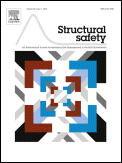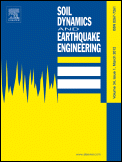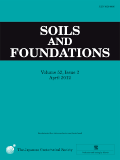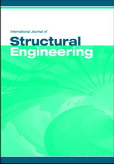
Earthquake Engineering and Engineering Vibration
metrics 2024
Transforming engineering practices for earthquake preparedness.
Introduction
Earthquake Engineering and Engineering Vibration, published by Springer, is a leading international journal dedicated to the field of earthquake engineering, structural dynamics, and the associated vibrational research integral to understanding and mitigating seismic risks. With its print ISSN 1671-3664 and E-ISSN 1993-503X, the journal operates from its headquarters in New York, USA. The journal has achieved a commendable Q2 category ranking across multiple engineering disciplines, reflecting its importance to the building and construction, civil and structural engineering, geophysics, geotechnical engineering, and mechanical engineering fields. The journal serves as a vital platform for researchers, practitioners, and students to disseminate their findings, share innovative methodologies, and contribute to advancements in earthquake resilience and engineering practices. Earthquake Engineering and Engineering Vibration is committed to fostering open dialogue and collaboration within the global research community, ensuring that its contributions are both impactful and relevant to contemporary challenges in engineering and environmental safety.
Metrics 2024
 0.43
0.43 2.60
2.60 2.60
2.60 51
51Metrics History
Rank 2024
Scopus
IF (Web Of Science)
JCI (Web Of Science)
Quartile History
Similar Journals

STRUCTURAL SAFETY
Innovating reliability for resilient structures.STRUCTURAL SAFETY is a premier journal dedicated to advancing the field of engineering with a focus on safety, risk, reliability, and quality in structural analysis and design. Published by Elsevier, this esteemed journal boasts an impressive Impact Factor and ranks in the top quartiles (Q1) of key categories including Building and Construction, Civil and Structural Engineering, and Safety, Risk, Reliability, and Quality. With a significant history spanning from 1982 to 2024, STRUCTURAL SAFETY fosters scholarly exchange among researchers, professionals, and students by publishing innovative and high-quality research articles that contribute to the safety and resilience of engineered structures. The journal operates without open access barriers, ensuring a broad audience can access invaluable insights in the engineering realm. Its distinguished Scopus rankings further underscore its impactful role within the academic community, making it an essential resource for anyone invested in the discipline of structural safety.

SOIL DYNAMICS AND EARTHQUAKE ENGINEERING
Empowering Engineers with Insights on Soil Dynamics and Seismic HazardsSOIL DYNAMICS AND EARTHQUAKE ENGINEERING is a premier academic journal published by ELSEVIER SCI LTD, focusing on the intersection of civil and structural engineering, geotechnical engineering, and soil science. Since its inception in 1986, the journal has established itself as a critical resource for advancing knowledge in these fields over nearly four decades, with a remarkable Q1 ranking in 2023 across multiple categories, including Civil and Structural Engineering, Geotechnical Engineering, and Soil Science. The journal’s impactful research, reflected in its high Scopus ranks, serves as a vital reference for both professionals and academics dedicated to understanding soil dynamics and mitigating earthquake hazards. Although it currently does not offer open access, the journal's rigorous peer-review process ensures that published articles provide substantial contributions to the understanding of soil behavior under seismic conditions. Whether you are a researcher, a practitioner, or a student, SOIL DYNAMICS AND EARTHQUAKE ENGINEERING offers essential insights and innovative methodologies pivotal for advancing your work in soil dynamics and earthquake engineering.

Seismic Instruments
Elevating the understanding of seismic activity through collaboration.Seismic Instruments is a prestigious academic journal dedicated to advancing the field of geophysical instrumentation and its applications in seismic studies. Published by PLEIADES PUBLISHING INC, this journal serves as a crucial resource for researchers, professionals, and students interested in the development, evaluation, and deployment of seismic instrumentation technologies. Although it does not currently offer open access, it provides a comprehensive platform for high-quality research articles, reviews, and technical notes that explore the latest innovations and findings in seismic studies. With an ISSN of 0747-9239 and an E-ISSN of 1934-7871, Seismic Instruments aims to foster collaboration and knowledge exchange among the global academic community, emphasizing the importance of instrumentation in understanding seismic activity and its implications for engineering, environmental science, and hazard mitigation.

STRUCTURAL ENGINEERING AND MECHANICS
Unveiling Insights into Structural Systems and MechanicsSTRUCTURAL ENGINEERING AND MECHANICS, a leading journal published by TECHNO-PRESS, stands at the forefront of research in the disciplines of civil, structural, and mechanical engineering. With an ISSN of 1225-4568 and an E-ISSN of 1598-6217, this South Korea-based journal has been a significant contributor to the academic community since its inception in 1994, and it continues to disseminate vital research through 2024 and beyond. Achieving a Q3 ranking in key categories such as Building and Construction, Civil and Structural Engineering, Mechanical Engineering, and Mechanics of Materials, the journal is recognized for its high standard of academic rigour and relevance in contemporary engineering challenges. Although not Open Access, it offers robust access options for institutions and professionals seeking to advance their understanding of structural systems and mechanics. Researchers, students, and practitioners in these fields will find invaluable insights and innovative studies that push the boundaries of knowledge, making this journal an essential resource for anyone invested in engineering advancements.

Soils and Foundations
Transforming foundations with cutting-edge scientific insights.Soils and Foundations, an esteemed journal published by the Japanese Geotechnical Society, has established itself as a pivotal platform for innovative research in Civil and Structural Engineering and Geotechnical Engineering. With an impressive impact factor reflected in its Q1 quartile ratings for both disciplines, the journal provides critical insights that foster advancements in the understanding of soil behavior and foundation design. Since its transition to Open Access in 2020, Soils and Foundations has broadened its reach, ensuring accessible dissemination of knowledge to researchers, students, and professionals globally. With a rich history dating back to its inception in 1960, the journal continues to uphold a high standard of scholarly excellence, ranking within the top percentile in Scopus across geotechnical engineering fields. This commitment to quality and accessibility makes it an essential resource for anyone engaged in the vital areas of soil mechanics and foundation engineering.

EARTHQUAKE SPECTRA
Exploring the forefront of earthquake engineering research.EARTHQUAKE SPECTRA, published by SAGE PUBLICATIONS INC, is a premier journal dedicated to the field of geophysics, geotechnical engineering, and engineering geology, with a specific focus on seismic phenomena. Issued both in print (ISSN: 8755-2930) and electronically (E-ISSN: 1944-8201), the journal has maintained its position as a leading source of high-quality research since its inception in 1984. Recognized in the 2023 Category Quartiles as Q1 in both geophysics and geotechnical engineering, it is highly regarded in the academic community, ranking 11 out of 165 in its field, placing it in the 93rd percentile of Earth and Planetary Sciences, and 30 out of 229 for geotechnical engineering with an 87th percentile standing. With a commitment to advancing knowledge and practice in earthquake engineering, EARTHQUAKE SPECTRA publishes original research, case studies, and critical reviews that inform the design and construction practices related to seismic events. Although it does not currently offer open access, the journal's impact on the discipline remains significant, making it an essential resource for researchers, professionals, and students dedicated to understanding and mitigating the effects of earthquakes.

Transportation Infrastructure Geotechnology
Pioneering Research in Infrastructure Sustainability and Safety.Transportation Infrastructure Geotechnology, an esteemed journal published by SpringerNature, serves as a vital platform in the fields of Civil and Structural Engineering, Environmental Engineering, Geotechnical Engineering, and Transportation. Established in 2014 and spanning a decade of significant scientific discourse, this journal has gained recognition for its robust contribution to the understanding of the interplay between geotechnical processes and transportation infrastructure. With an impactful Q2 ranking in multiple categories—including Civil and Structural Engineering and Environmental Engineering—it emphasizes innovative research and practical applications globally. Researchers and professionals can explore critical topics that influence infrastructure sustainability, safety, and efficiency. Although it operates under a subscription model, its affiliation with SpringerNature ensures rigorous peer-review and high-quality publications, making it an indispensable resource for academics and industry experts alike.

Bulletin of Earthquake Engineering
Innovating solutions for earthquake safety.The Bulletin of Earthquake Engineering is a premier journal published by Springer, dedicated to the field of earthquake engineering and its related disciplines. Established in 2003, this esteemed journal has evolved into a critical platform for disseminating cutting-edge research in Building and Construction, Civil and Structural Engineering, Geophysics, and Geotechnical Engineering and Engineering Geology, earning a distinguished position in the Q1 quartile across these categories. With an impressive ranking in Scopus, notably a rank of #8 in Earth and Planetary Sciences for Geophysics, the journal addresses urgent challenges in the mitigation of seismic risks and the enhancement of structural resilience. Researchers and practitioners benefit from a wealth of peer-reviewed articles, insights, and methodologies relevant to modern engineering practices aimed at improving safety and sustainability in earthquake-prone regions. The Bulletin of Earthquake Engineering embodies a commitment to advancing knowledge and practice in earthquake resilience, making it an invaluable resource for academics, industry professionals, and rising scholars alike.

International Journal of Steel Structures
Bridging Theory and Practice in Steel EngineeringWelcome to the International Journal of Steel Structures, a distinguished publication dedicated to advancing the field of civil and structural engineering since its inception in 2010. Published by the Korean Society of Steel Construction (KSSC), this journal aims to provide a platform for researchers and professionals to share innovative findings and essential insights related to steel structures, emphasizing both theoretical and applied research. With an impact factor that reflects its growing recognition—ranking in Q3 within the civil and structural engineering category—the journal has positioned itself as a significant contributor to the body of knowledge in this vital field. Although currently not an open-access publication, it remains an invaluable resource for students and scholars keen on exploring contemporary challenges and advancements in steel construction. Located in Seoul, South Korea, the journal continues to evolve, converging its presence into the future, with publication efforts spanning through to 2024. Engage with us as we explore the innovative applications and developments in the realm of steel structures.

International Journal of Structural Engineering
Transforming Ideas into Structural SolutionsInternational Journal of Structural Engineering, published by InderScience Enterprises Ltd, has established itself as a vital resource in the field of civil and structural engineering. With an ISSN of 1758-7328 and an E-ISSN of 1758-7336, this journal is dedicated to disseminating high-quality research that addresses contemporary challenges and innovations in structural engineering. The journal operates under a rigorous peer-review process, ensuring that only the most impactful and relevant studies are shared with the global community. Since its inception in 2009, the journal has been recognized for its contributions, earning a ranking in Q3 for civil and structural engineering under the 2023 Category Quartiles and occupying the 40th percentile in Scopus rankings. While currently not an open-access journal, it provides access to a wide array of original papers, reviews, and case studies that are crucial for fostering academic discourse and supporting the ongoing education of professionals and students alike. As it continues to expand its reach until 2024, the International Journal of Structural Engineering remains a cornerstone for those seeking to enhance their knowledge and practice in the dynamic realm of structural engineering.